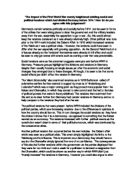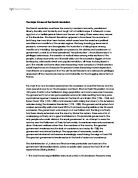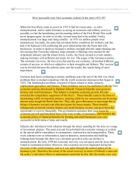Hitlers Germany
DICTATOR IN the spring of 1938, on the eve of his greatest triumphs, Adolf Hitler entered his fiftieth year. His physical appearance was unimpressive, his bearing still awkward. The failing lock of hair and the smudge of his mustache added nothing to a coarse and curiously undistinguished face, in which the eyes alone attracted attention. In appearance at least Hitler could claim to be a man of the people, a plebeian through and through, with none of the physical characteristics of the racial superiority he was always invoking. The quality which his face possessed was that of mobility, an ability to express the most rapidly changing moods, at one moment smiling and charming, at another cold and imperious, cynical and sarcastic, or swollen and livid with rage. Speech was the essential medium of his power, not only over his audiences but over his own temperament. Hitler talked incessantly, often using words less to communicate his thoughts than to release the hidden spring of his own and others' emotions, whipping himself and his audience into anger or exaltation by the sound of his voice. Talk had another function, too. 'Words,' he once said, 'build bridges into unexplored regions." As he talked, conviction would grow until certainty came and the problem was solved. Hitler always showed a distrust of argument and criticism. Unable to argue coolly himself, since his early
Charles Darwin
Charles Darwin Charles Darwin was born on February 12, 1809 in Shrewsbury, England. He was the British naturalist who became famous for his theories of evolution and natural selection. Like several scientists before him, Darwin believed all the life on earth evolved (developed gradually) over millions of years from a few common ancestors. From 1831 to 1836 Darwin served as naturalist aboard the H.M.S. Beagle on a British science expedition around the world. In South America Darwin found fossils of extinct animals that were similar to modern species. On the Galapagos Islands in the Pacific Ocean he noticed many variations among plants and animals of the same general type as those in South America. The expedition visited places around the world, and Darwin studied plants and animals everywhere he went, collecting specimens for further study. Upon his return to London Darwin conducted thorough research of his notes and specimens. Out of this study grew several related theories: one, evolution did occur; two, evolutionary change was gradual, requiring thousands to millions of years; three, the primary mechanism for evolution was a process called natural selection; and four, the millions of species alive today arose from a single original life form through a branching process called "specialization." Darwin's theory of evolutionary selection holds that variation within
Causes of show trials + purges of 1930s.
Causes of show trials+purges of 1930s There have been many devastating events which have made great marks in history. Events of notable mention are the Nazi Holocaust of WW2, the use of the atomic bomb at Hiroshima, and the great terror of the 1930's in the Soviet Union. This great terror was sparked by a number of events, none more notable than the assassination of Sergei Kirov on the 1st of December 1934. There are many other reasons that the Soviet government use to justify these events, such as to defy attacks by counter-revolutionists, to clean up the Communist Party and to exterminate old ideals that are no longer supported by the Party. Historians argue these ideas to this very day, with many of them disagreeing on the topic of what actually provoked the purges. Some even argue the fact that Stalin should not have been in power, but instead he simply manipulated the government to his own ideals. However there is one thing that can not be disputed by any historian, and that is that fact that these purges and show trials were all major historical events, with much interest from across the world. The show trials and purges had a mixed reaction around the Western world, but by reading newspapers from the time of the incidents it can be seen that all countries come to a basic consensus. This consensus is that the actions that the Soviet Union took against the accused were
The Impact of Stalins Leadership in the USSR, 1924 1941. Extensive notes
The Impact of Stalin’s Leadership in the USSR, 1924 – 1941 AQA HIS2L Stalin’s personal rule The sources of Stalin’s strengths: Stalin’s rise to power did not begin with Lenin’s death. His positions within the party had already given him significant influence. . As General Secretary, Stalin ran the party machine, meaning he occupied probably the most important position in the USSR and he could decide promotions to party positions (Lenin enrolment) 2. As a member of the Politburo, Stalin was one of the small group of leading communists who met regularly to make policy. These were the decision makers of the USSR. 3. As a member of the Secretariat and Orgburo, Stalin was also responsible for carrying out policy decisions and monitoring the members of the party. 4. Between 1917 and 1923, Stalin was Commissar for Nationalities. He supervised party officials in non-Russian republics like the Ukraine. 5. As head of the Workers’ and Peasants’ Inspectorate, Stalin supervised the work of all government departments. In theory, the Bolshevik party ran the whole country. The struggle for power after Lenin’s death was partly about policy, and partly about personalities. Stalin won the personal and policy battle. The policies he introduced or associated with his name were more in keeping with soviet needs at the time. Stalin’s strengths in the power
Stalins Russia, 1924-53 revision guide
Unit 1D4: Stalin's Russia, 1924-53 A: The Struggle for Power * Lenin was very ill for many months before his death in January 1924. During this time the Party elite continued running the country. There was no mechanism for replacing Lenin. * Stalin was given responsibility for supervising Lenin's treatment by the Central Committee. No one visited Lenin as much as Stalin. However, Stalin offended Lenin by being rude to his wife. * Lenin and Stalin also disagreed about foreign trade, which Lenin wanted to keep in the hands of the government, but Stalin wanted to relax. Lenin also disagreed with Stalin's treatment of the independence movement in Georgia, which had been suppressed. * Lenin died January 1924. The Politburo - Rykov, Tomsky, Kamenev, Zinoviev, Trotsky and Stalin announced their intention of ruling as a collective leadership. * Stalin put Trotsky at a disadvantage by appearing at Lenin's funeral as chief mourner and delivering the oration. Trotsky later claimed that Stalin had given him the wrong date, so he did not attend the funeral. * This was the beginning of Stalin's successful promotion of the 'cult of Lenin' and 'Leninism'. Stalin successfully associated himself with the authority and philosophy of Lenin. He portrayed himself as Lenin's disciple. * May 1924 Thirteenth Party Congress. The content of Lenin's Political Testament was revealed secretly to
Reasons for Napoleon's Success (to 1807).
Reasons for Napoleon's Success(to 1807) a) Napoleon's Strength - The Military Aspect i) Napoleon's Qualities of Leadership ii) The Changing Nature of War iii) The Development of the Grand Armee iv) The Development of Winning Tactics v) Weapons Training in the Grande Armee vi) Napoleon's Strategic Planning vii) Napoleon's Generalship b) Napoleon's Strength - the Civil Aspect c) The Enemies' Weakness - Allied Disunity i) The Second Coalition 1799 ii) The Third Coalition 1805 a) Napoleon's Strength - The Military Aspect i) Napoleon's Qualities of Leadership * One of Napoleon's great strengths as leader was the devotion of his men. His soldiers adored him. * Despite his generally unprepossessing appearance, when he wished to charm he could quickly win over anyone he met, however initially hostile they might be. Within a couple of days he had completely captivated the officers and crew of Bellerophon taking him to St. Helena in 1815, much alarming the British government. * One Admiral at that time exclaimed, "If he had an obtained an interview with His Royal Highness the Prince Regent, in half an hour they would have been the best friends in England!" * His contemporaries had no doubt about the charismatic quality of leadership. His great adversary Wellington said to him that the moral effect of his presence in the field and worth an additional force of 40,000
Lenin and the Bolshevik revolution.
LENIN AND THE BOLSHEVIK REVOLUTION Could the Bolshevik Revolution have taken place without the participation of the founder and perpetual leader of the Bolsheviks? Really, the question seems too silly to ask. Lenin's fingerprints are all over the October insurrection. However, it is not logically inconceivable that a popular uprising could have taken place against the Provisional Government without the aid of Lenin or his party. It will be contended in this chapter that such an uprising was, if not inevitable, then certainly very probable. This will be shown through the use of the model developed in chapter one. The analysis presented in this chapter will proceed through two steps, corresponding to the two questions raised by the model. First it will be shown that there was a strong popular demand for many of the policies which the Bolsheviks were to incorporate into their programme. Some of the groups making these demands (especially the soldiers and sailors) were armed, and were concentrated in the vicinity of Petrograd and, to a smaller degree, Moscow. These groups were, therefore, both ideally situated to launch a coup d'etat in order to achieve their goals, and entirely willing to do so. They lacked only a "vanguard" to coordinate their efforts. According to the model developed in Chapter One, these groups could be expected to search out, support, and in a sense
Vietnam war
* Total U.S. bomb tonnage dropped during: World War II = 2 057 244 tons Vietnam War = 7 078 032 tons (3.44 times as much as WWII) * Bomb tonnage dropped during the Vietnam War amounted to 000 lbs. for every man, woman and child in Vietnam. * An estimated 70 000 draft evaders and "dodgers" were living in Canada by 1972. * A Cornell University study placed the over-all total U.S. cost of the Vietnam war at $200 Billion * 30 April 1969 - Peak US troop strength 543 000 * Approximately 12,000 helicopters saw action in Vietnam * 9,087,000 military personnel served on active duty during the Vietnam era (August 5, 1964 - May 7, 1975). * 8,744,000 GIs were on active duty during the war (August 5, 1964 - March 28, 1973). * Married men killed: 17,539. * 61% of the men killed were 21 or younger. * Hostile (VC, NVA) deaths: 47,359. * Non-hostile (US, ARVN) deaths: 10,797. * POWs: 766 (114 died in captivity). * Total draftees (1965-73): 1,728,344. * Draftees accounted for 30.4% (17,725) of combat deaths in Vietnam. * Twenty-five (25) percent of the total United States forces serving in Vietnam were draftees * 76% of the men sent to Vietnam were from lower middle/ working class backgrounds * 82% of veterans who saw heavy combat strongly believe the war was lost because of lack of political will * (1993) Nearly 75% of the public agrees it was a failure of political
Hitler and the Nazi Regime - revision sheet.
IB G SINGLEPARTY STATES IB REVIEW SHEET IV Directions: Students should complete the following chart for each authoritarian regime (Stalin & Hitler) as it is discussed during the course. Be as complete as possible, this chart will help you review for the IB examinations. Note: Completing charts on the Perón (Argentina) and Castro (Cuba) regimes with information learned during History of the Americas I HL is also required. NOTE: CHART IS NOT TO SCALE!!!!!! REGIME: HITLER I. ORIGINS AND NATURE OF AUTHORITARIAN AND SINGLE-PARTY STATES A. Conditions that produced the regime A. Conditions that Produced the Regime . Treaty of Versailles Nazi Germany arose in the wake of national shame, embarrassment, anger, and resentment resulting from the Treaty of Versailles (1919) that dictated to the vanquished Germans, responsibility for Germany's acceptance of and admission to sole responsibility for causing the First World War. Also, Germany had to take responsibility for the permanent loss of various territories and the demilitarization of other German territory. Germany had to pay heavy reparations justified in the Allied view by the War Guilt clause. Germany also had to take responsibility for unilateral German disarmament and severe military restrictions. . National Conditions Other conditions fostering the rise of the Third Reich include the nationalism and
Soviet State
The Soviet State under Stalin Stalin's Role in the Soviet State The crisis of modernisation: from indirect to direct mobilisation * The emergence of the Stalinist machine opened up new approaches to the underlying problem of backwardness. By the late 1920s a very different situation made available to the government a third strategy - to tackle the peasantry head on and take what was necessary by force as it had during the period of War Communism. The precondition of this was the strengthened ruling group and a powerful and ruthless leadership. * Strategies of direct mobilisation appeared once more on the Party's agenda, with Stalin as their main sponsor. * By 1929 the Stalinist machine provided the spine of such as system. And the emergence of Stalin as undisputed leader gave the system a unity and decisiveness it lacked during the power struggle. Meanwhile the other organs of the coercive machinery were the army and police which had a decade of relative stability to grow their traditions. * As leader of such a group, Stalin was in a position to pursue the twin goals of industrial growth and military power more ruthlessly than any other Russian ruler. During the 1930s he showed that he possessed both the will and ability to do so. Introduction of Collectivisation and Industrialisation (Five Year Plans) A Social Revolution * In 1929 the Soviet Government launched a



























